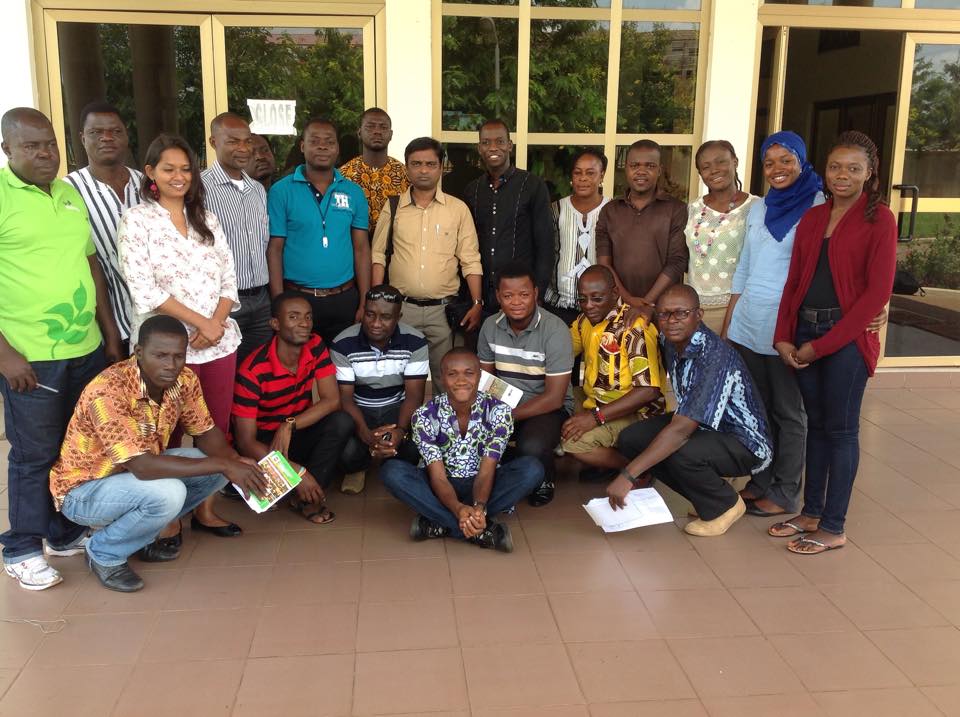IFDC IMPLEMENTING FEED THE FUTURE AGRICULTURE TECHNOLOGY TRANSFER Project
IFDC is the institution implementing the "Feed the Future - Ghana Agriculture Technology Transfer project in collaboration with Digital Green organised a 8 day workshop to train extension agents on how to facilitate, mediate, film and produce a agriculture video and disseminate to farmers in their communities.
The project which aims at increasing the yields and improving the lives of farmers across the region.
One of the challenges the farmers and agriculture agents face is effective communication, and with video agriculture agents will be able to use both visual and audio " video " to communicate better and effectively.
At the end of the workshop agents can produce agriculture videos using farmers in various communities to further more enhance farmer to farmer learning. As the saying goes " Seeing Is Believing "
The workshop kicked stated with Retika Pandey speed dating session method of introduction where participants briefly introduced themselves to each other. Participants were also asked to write down their expectations after the 8 days training. Digital Green facilitators also made participants to set rules and regulations to govern their 8 days training.
Retika Pandey gave participants a summary of why they are here and what Digital Green have been doing and how they can take participants through the steps involved in producing, dissemination and meditation to enhance farmer to farmer communication and farmer extension agent relationship.
B praveen kumar took participants through the steps involved in using a tripod and also mounting the Kodark play touch camera.
Namita Singh also took participants through the basic steps in cinematography, and how to use the Kodark play touch to get right shoots to make a beautiful video.
Srinivas k reminded participants of the Rule of Thirds and the 180 degree circle in filming.
In all Digital Green facilitators were able to educate participants on the steps involved in pre production and post production within 4 days.
Praveen, Namita and Srinivas took the participants on different session and with both practical and verbal demonstrations to enlighten participants on the basic steps and the dos and don't s in video production.
Participants got to know more about storytelling, storyboarding, Sound, lighting and directing.
Participants began video production, using 4 shots without sound to tell a story, then later participants were asked again to use 8 shots with sound to tell a story. And finally participants where taken to the field to produce agriculture video. Participants received assistance from Digital Green facilitators during the field visit.
In all participants were able to produce 4 agriculture related videos, Digital Green facilitators took participants through the editing of videos using windows movie maker and a basic editing took for beginners.
After the editing process, participants were again introduced to a new screening equipment called the Pico projector. With this mini projector with a memory chip, participants were shown how to insert the videos they produced in to the memory chip and inserted it into the Pico projector. Among the four videos produce each video was screened to the participants to watch and make adjustments or corrections if any is been noticed by the participants.
Facilitators advised participants to seek for adequate and credible information on agriculture practices before making agriculture videos and disseminating it to farmers.
Facilitators also advised participants to use simple and logical examples and demonstrations to convince farmers to adopt to the new technologies been introduced to the farmers.
Digital Green facilitators again took participants through a communication session were participants got to learn how to communicate and disseminate videos to farmers. Participants were taken through basic communication and presentation skills to make their relationship with farmers easy and accessible.
Participants were advised to cross check their videos, make sure their Pico projector is well charged before the day of screening, participants were also asked to pay attention to farmers and give credible answers to farmers questions.
Facilitators advised participants to conduct screening among 15 to 20 farmers, this will enable the mediator or extension agents to monitor, identify and concentrate on each farmer at a time to be able to address the concerns they raised
Digital Green facilitators encourage participants to work as a team to be able to achieve IFDC target goal of reaching 7000 + farmers before April next year. Facilitators gave physical and logic demonstrations task to participants to see and feel the importance of team work, which is the only way to achieve this goal.









Comments
Post a Comment